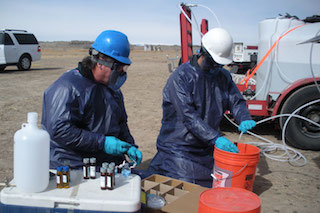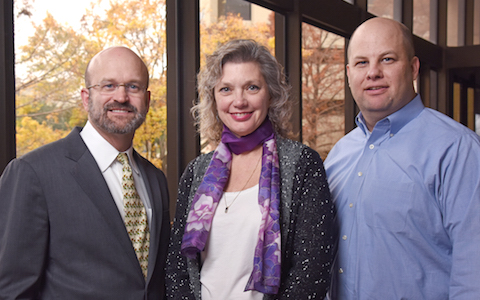Texas
See the following -
Amid adoption Inroads, Texas Looks To Statewide HIT
When the Texas Health and Human Services Commission (HHSC) last studied the state’s health IT landscape in 2009, there was fairly broad consensus about the potential benefits of IT, “but provider adoption rates accelerated slowly and many communities lacked the unified visions needed to create and sustain the infrastructure to share records between organizations' [...]. Read More »
- Login to post comments
As Fracking Booms, Growing Concerns About Wastewater
With hydraulic fracturing for oil and gas continuing to proliferate across the U.S., scientists and environmental activists are raising questions about whether millions of gallons of contaminated drilling fluids could be threatening water supplies and human health. Read More »
- Login to post comments
Computer Science Professor on the Changing Face of Tech
 Dr. Kyla McMullen spoke at OSCON's morning keynote session today. She was the first African-American woman to graduate with a PhD in Computer Science and Engineering at the University of Michigan. And it says a lot about tech's lack of inclusiveness that this landmark achievement happened in 2012. These days she is Assistant Professor in Computer Science at the University of Florida. In her keynote, Dr. McMullen explained that as a child she was a tinkerer and reader—like most of us in the room...
Dr. Kyla McMullen spoke at OSCON's morning keynote session today. She was the first African-American woman to graduate with a PhD in Computer Science and Engineering at the University of Michigan. And it says a lot about tech's lack of inclusiveness that this landmark achievement happened in 2012. These days she is Assistant Professor in Computer Science at the University of Florida. In her keynote, Dr. McMullen explained that as a child she was a tinkerer and reader—like most of us in the room...
- Login to post comments
Does The Military Have Enough Psychiatrists?
Twelve consecutive years of war have turned soldiers into the subjects of an unintended experiment in the impact of prolonged conflict on the human psyche. And the results are still out, according to Army Surgeon General Patricia Horoho, who testified Wednesday at a congressional hearing.
- Login to post comments
Drones Are More Helpful than Ever in Hurricane-Ravaged Texas and Florida
Unmanned aircraft — small and large — swooped in during the aftermath of Hurricanes Irma and Harvey to get a glimpse of the devastation. That's why insurance companies have been using drone technology more than ever before to quickly -- and safely -- assess damage from the storm. It's only been fairly recently that commercial drone technology has advanced enough to take on this task on a large economic scale. And the insurance industry is just beginning to fully embrace it...
- Login to post comments
How Technology Can Help Mitigate Hurricane Harvey-Like Disasters
Unfortunately, we don’t yet have technology that can prevent a storm of the magnitude of Hurricane Harvey from devastating our cities and towns. But it can help in the response, and even provide valuable information for citizens trying to survive a catastrophic event. One key is properly locating backup and recovery systems for government agencies. Typically, most cities and towns with a backup plan for their data rely on nearby data centers. That’s fine if there is a fire at the local office building or something that forces the temporary closure of government buildings...
- Login to post comments
Hurricane Harvey: Responding to Public Health and Infectious Disease Threats
 The membership of the Infectious Diseases Society of America and the HIV Medicine Association stand with the individuals, families and communities affected by flooding in the aftermath of Hurricane Harvey, and urge care, preparation and precautions in confronting health impacts that may pose risks in the days and weeks ahead. We would like first to emphasize that while widespread disease outbreaks after flooding remain uncommon in the United States, hand hygiene, clean water, as well as access to medications will be essential for preventing and limiting the spread of infectious diseases during this time...
The membership of the Infectious Diseases Society of America and the HIV Medicine Association stand with the individuals, families and communities affected by flooding in the aftermath of Hurricane Harvey, and urge care, preparation and precautions in confronting health impacts that may pose risks in the days and weeks ahead. We would like first to emphasize that while widespread disease outbreaks after flooding remain uncommon in the United States, hand hygiene, clean water, as well as access to medications will be essential for preventing and limiting the spread of infectious diseases during this time...
- Login to post comments
Hurricanes Harvey and Irma Draw the Line - Time for the US to Embrace Open Source Emergency and Disaster Response
 For nearly 20 years now the global open source community and applications have been a keystone to disaster relief efforts around the world. The enormous number of disaster relief applications and knowledge that has been developed through all these years, should, and needs to be leveraged in the current crisis. For that reason, Open Health News is starting a series of articles to highlight some of the most important solutions. A substantial portion the open source applications for emergency and disaster response that exist are actually already on the news website in the form of articles and resource pages.
For nearly 20 years now the global open source community and applications have been a keystone to disaster relief efforts around the world. The enormous number of disaster relief applications and knowledge that has been developed through all these years, should, and needs to be leveraged in the current crisis. For that reason, Open Health News is starting a series of articles to highlight some of the most important solutions. A substantial portion the open source applications for emergency and disaster response that exist are actually already on the news website in the form of articles and resource pages.
- The Future Is Open
- Login to post comments
Map Lab Science Graphic Of The Week: Map Shows Half Of The U.S. Suffering Drought Conditions
It’s not just California’s problem. Nearly half of the contiguous U.S. is experiencing abnormally dry or drought conditions right now...
- Login to post comments
Millions of Americans Live Nowhere Near a Hospital, Jeopardizing Their Lives
As a nurse practitioner, Wanda Liddell knew it was a medical emergency when she saw one of her patients struggling to breathe last month. But in her backcountry town of Cross City, Florida, the ambulance took 30 minutes to arrive. Even worse, it was another 45 miles to the nearest hospital. Liddell faces this situation often and always wonders, what if? She is one of many medical providers working in towns 30 miles or more from a hospital, a distance that can make the difference between life or death...
- Login to post comments
No Accurate Records Kept Of Serious Chemical Accidents In U.S.
Following the horrific explosion in West, Texas, earlier this year, the Dallas Morning News wanted to find out how many serious chemical accidents had occurred in the United States. The newspaper combed through 750,000 federal records, only to learn that no single agency in the federal government has been keeping track... Read More »
- Login to post comments
Sébastien Jodogne, ReGlue are Free Software Award winners
Free Software Foundation executive director John Sullivan announced the winners of the FSF's annual Free Software Awards at a ceremony on Saturday, March 21st, held during the LibrePlanet 2015 conference at MIT, in Cambridge, Massachusetts...The Award for the Advancement of Free Software is given annually to an individual who has made a great contribution to the progress and development of free software, through activities that accord with the spirit of free software. This year, it was given to Sébastien Jodogne for his work on free software medical imaging with his project Orthanc.
- Login to post comments
Shutdown Of DHS Chemical-Security Program Prompts Strong Words
The Homeland Security Department's chemical-security program ceased most operations this week as a result of the federal shutdown, prompting concerns about how the government will improve security in the wake of this year's fatal explosion in Texas. Read More »
- Login to post comments
Stanford Researchers Show Fracking's Impact to Drinking Water Sources
 Only one industry is allowed to inject toxic chemicals into underground sources of drinking water – hydraulic fracturing, or “fracking.” Concerns about this practice have riled the U.S. political landscape and communities around the country, perhaps nowhere more so than in Pavillion, Wyoming, population 231. A new study by Stanford scientists published in Environmental Science & Technology finds for the first time that fracking operations near Pavillion have had clear impact to underground sources of drinking water.
Only one industry is allowed to inject toxic chemicals into underground sources of drinking water – hydraulic fracturing, or “fracking.” Concerns about this practice have riled the U.S. political landscape and communities around the country, perhaps nowhere more so than in Pavillion, Wyoming, population 231. A new study by Stanford scientists published in Environmental Science & Technology finds for the first time that fracking operations near Pavillion have had clear impact to underground sources of drinking water.
- Login to post comments
Study Identifies a Way to Prevent Burn Injury Infection – Without Antibiotics
 A new way to fight multidrug-resistant bacteria by blinding them rather than killing them proved highly effective in a model of burn injuries, UT Southwestern Medical Center research shows. “In the United States, there are more than 1 million burn injuries and 100,000 hospitalizations annually. Up to 75 percent of the mortality in burn patients is associated with infections, which are particularly common in patients who suffer extensive burns – those that cover 40 percent or more of the body,” said Dr. Steven Wolf, Section Chief for Burns and Professor of Surgery at UT Southwestern Medical Center...
A new way to fight multidrug-resistant bacteria by blinding them rather than killing them proved highly effective in a model of burn injuries, UT Southwestern Medical Center research shows. “In the United States, there are more than 1 million burn injuries and 100,000 hospitalizations annually. Up to 75 percent of the mortality in burn patients is associated with infections, which are particularly common in patients who suffer extensive burns – those that cover 40 percent or more of the body,” said Dr. Steven Wolf, Section Chief for Burns and Professor of Surgery at UT Southwestern Medical Center...
- Login to post comments